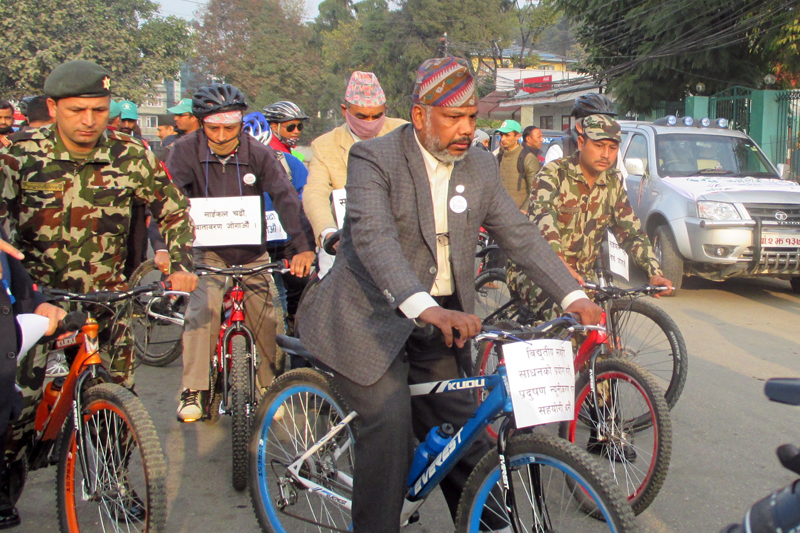Cycle rally held to promote green cause
Kathmandu, November 25
The Ministry of Science, Technology and Environment and Cycle City Network Nepal today jointly organised a grand cycle rally to promote eco-friendly mode of transport and reduce dependence on petroleum products.
The theme of the cycle rally was “Let’s save every drop of fuel, let’s use eco-friendly mode of transport.” The cycle rally commenced from Jawalakhel at 7.30 am and proceeded through Kupandole, Thapathali, Sundhara, Ratna Park, Bhotahoti, Jamal, Keshar Mahal, Southern Gate of Narayanhiti, Jaya Nepal, Krishna Pauroti, Putali Sadak, Padmodaya Mod, Brikhtimandap, City Hall, Bhadrakali and Maitighar before converging on the premises of the Department of Roads, Babar Mahal.
Minister for Science, Technology and Environment Bishwendra Paswan, MoSTE Secretary Krishna Chandra Paudel, former chief secretary Leela Mani Paudyal, professional cyclists, representatives of various government and non-government agencies, police and the general public participated in the rally.
Some took part in the rally with electric scooters and vehicles. Minister Bishwendra Paswan, who pedalled all the way from the starting to end, highlighted the benefits of cycling.
“On personal front, cycling results in increased access and mobility, and workout for physical fitness and better health. On the societal front, it offers a huge potential for sustainable environment and reduces emission of greenhouse gases. It is cost-effective from financial perspectives too,” he explained.
Minister Paswan encouraged all to switch to eco-friendly mode of transport to reduce the country’s dependence on imported petroleum products. Secretary Paudel said the cycle rally was a symbolic support to efforts being made to tackle global warming in the run-up to the United Nations Climate Change Conference-2015 scheduled to be held in Paris from November 30.
According to Clean Energy Nepal, rapid increase in motorisation, particularly in developing countries, has huge economic, environmental, social and health cost from increasing traffic congestion, road fatalities, air pollution and carbon emissions.
In this context, cycling offers an efficient, eco-friendly and inexpensive mobility option for cities. Providing proper infrastructures and services for cycling will encourage more people to cycle. It complements public transport and gives rise to local economic development.
A recent study conducted by the Ministry of Physical Infrastructure and Transport and JICA shows that the travel mode share of cycling has decreased from 6.6 per cent in 1991 to 1.5 per cent in 2011.
During the same period, the modal share of motorcycles increased by almost three times. According to the 2011 census, 29.9 per cent of all urban residents in Nepal have bicycles while 23.6 per cent have motorcycles and only four per cent have cars.
In the Kathmandu Valley, however, more households (30 per cent) have motorcycles while only 11.4 per cent have bicycles and only 5.2 per cent have cars.
Although the government has not formulated specific plans and policies to promote cycling, the National Transport Policy mentions that in urban areas, cycle lanes will be managed separately. The first cycle track in Kathmandu runs from Tilganga to Sinamagal and is 1.8 km long.
The 2.7 km cycle track from Tinkune to Maitighar was constructed a couple of years ago.






